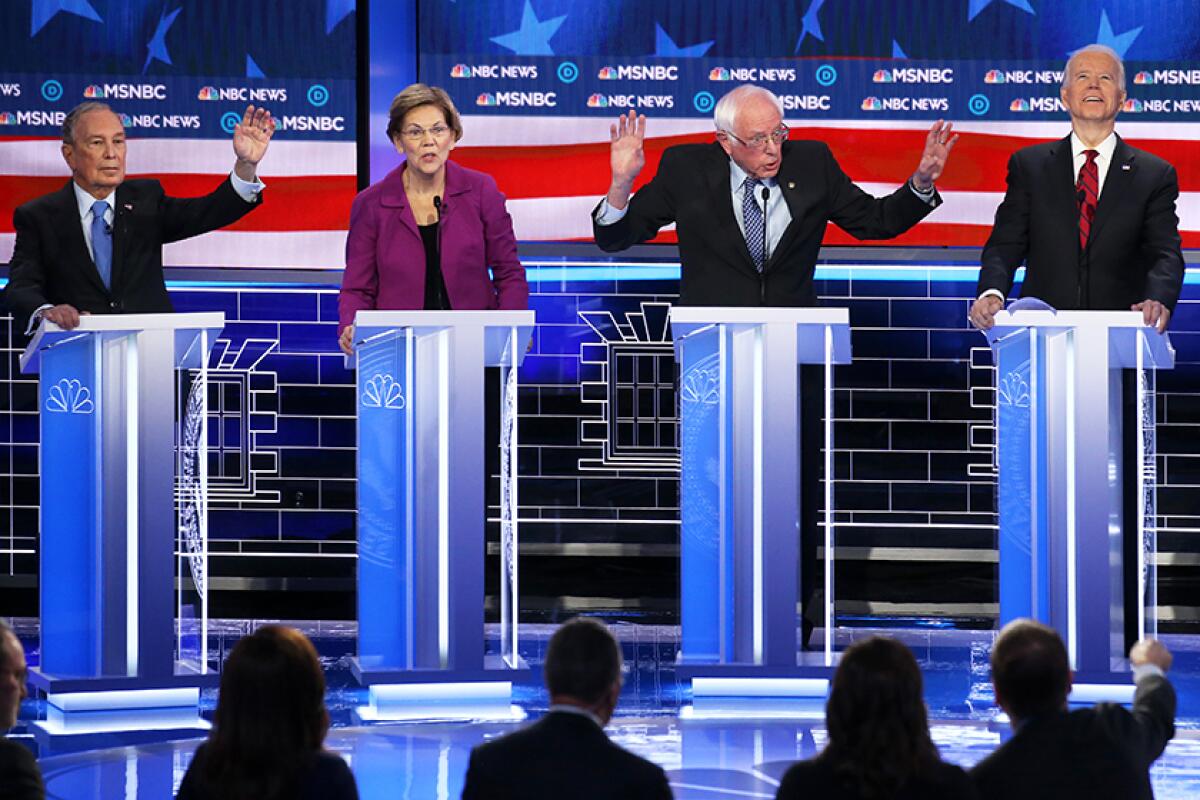Column: Elizabeth Warren changed the presidential landscape for women. Why couldn’t she go all the way?

Elizabeth Warren may not have succeeded in her race for the Democratic nomination, but she certainly did not fail.
Among other achievements, Warren single-handedly smashed the gilded candidacy of former New York Mayor Michael Bloomberg. He had spent hundreds of millions of dollars before he stepped onto the debate stage in Nevada, and right into Warren’s righteous buzz saw.
“I’d like to talk about who we’re running against — a billionaire who calls women ‘fat broads’ and ‘horse-faced lesbians,’” said Warren, right off the bat. “And no, I’m not talking about Donald Trump. I’m talking about Mayor Bloomberg.”
It was a stunning moment for a woman whose civility toward her Democratic opponents had been unflagging. I believe it will go down in history as one of the most consequential debate moments of all time. Warren’s anger and indignation were palpable. Hillary Clinton had to soft-pedal her emotions at every turn, lest she pay a political price. Warren’s calculated outburst in Nevada showed that women had had it with that double standard. Her controlled rage did not hurt her one bit; she was heralded far and wide as the winner of that debate, as the billionaire-slayer.
“You can’t walk away from the reality that she was the strongest debater, best on her feet, and to me, she showed that women are up to that,” said Debbie Walsh, director of the Center for American Women and Politics at Rutgers University’s Eagleton Institute. “She proved she is among the handful of people who could handle Trump in a debate.”
Warren appealed mightily to voters who saw themselves in her: white, college-educated women, mostly. But she was unable to expand her appeal. This I don’t fully understand, as her progressive policies, her famous plans for everything, and her optimistic nature would seem to be just the things Democrats are seeking.
“She had so many great moments, she seemed unstoppable back in October,” said Walsh.
Unfortunately, she struggled on two daunting fronts.
First, her stunning Nevada debate moment aside, she was unable to overcome the sexism that has always stymied women presidential candidates. For example, when Warren embraced “Medicare for all,” she was bombarded with demands to explain how to pay for it, which she did in November. Vermont Sen. Bernie Sanders, on the other hand, has gotten a pass on the issue. Less than two weeks ago, when pressed on how he would pay for Medicare for all by Anderson Cooper on “60 Minutes,” Sanders said, “Well, you know, I can’t rattle off to you every nickel and every dime.”
When, in a recent column, I wondered why Warren had failed to catch fire, I received this email from a reader: “From those I’ve spoken to,” he wrote, “she reminded many of the primary school teacher who wagged her finger at them in disapproval. Maybe her experience as a school teacher is the reason. She also has a weak, kvetchy voice.”
To which, I can only reply, oy.
“You can talk to a male voter, and they will say they want someone smart and highly educated, and here we have a Harvard law professor and she’s still being criticized,” said Betsy Fischer Martin, executive director of the Women & Politics Institute at American University. “Screechy, schoolmarm. … When was the last time you heard a man being described that way? Those are terms that are not applied to male candidates.”
Warren herself addressed the issue on Thursday at a news conference in Cambridge. “Gender in this race, you know, that is the trap question for every woman. If you say, ‘Yeah, there was sexism in this race,’ everyone says, ‘Whiner!’ And if you say there was no sexism, about a bazillion women think, ‘What planet do you live on?’ I promise you this — I will have a lot more to say on that subject later on.”
The other big problem Warren had was persuading voters that she was “electable,” that impossible-to-define quality that has become the sine qua non of the current cycle.
“There is a sense that Democrats absolutely have to win,” said Walsh, “this sense that Donald Trump is an existential threat to the planet and the universe. Out of that has come what I would say was a kind of risk-aversion, and unfortunately, women and people of color are still perceived as risky, outside the box.”
This is a little bit nutty when you consider that, a) we’ve already had a black president; and, b) women are currently serving as U.S. senators, Supreme Court justices and governors. But everything about this cycle seems nutty.
Warren has not endorsed a candidate yet; she is still deciding between Sanders and former Vice President Joe Biden.
I predict that whomever she endorses will end up being the Democratic nominee.
May she use her powers for the greater good and opt, of course, for the electable candidate.
@AbcarianLAT
More to Read
A cure for the common opinion
Get thought-provoking perspectives with our weekly newsletter.
You may occasionally receive promotional content from the Los Angeles Times.











